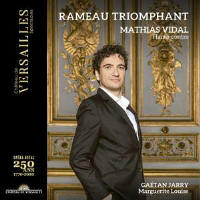Texte paru dans: / Appeared in: |
|
|
Outil de traduction (Très approximatif) |
|
|
Reviewer:
Richard Wigmore Very impressive he is, too, whether vying with hollering horns in Zoroastre’s exultant ‘Accourez, jeunesse brillante’, urging the (excellent) chorus to Bacchic excess in an air from Le temple de la gloire or musing amorously in a solo from Les fêtes de Polymnie. If his tone sometimes tightens on high notes, he musters the brilliance, energy and, where apt, muscular swagger that these arias – Rameau at his most Italianate – demand. He uses head voice sparingly but expressively, and always makes his words tell. His diction is a model for any French Baroque singer. Gaétan Jarry and his Ensemble Marguerite Louise are ideally idiomatic partners, relishing to the full Rameau’s colourful orchestral palette both in the vocal items and a raft of instrumental numbers. These include the astonishingly modern-sounding Ouverture to Les fêtes de Polymnie, opening with ominously piled-up dissonances, a riotous pair of tambourins from Dardanus and the majestic Chaconne from the same opera. Amid so much extroversion, the jewel of the recital, for me, is the Entrée de Polymnie from Les Boréades, with its bittersweet chains of suspensions – quintessential Rameau, this. True to form, Jarry and his players capture its voluptuous melancholy to perfection. Maybe I’m missing a subtle point, but I found the disc’s programming distinctly random. Why, I wonder, are excerpts from Act 4 of Dardanus presented in jumbled order and separated by the ariette from Zoroastre? And while the booklet contains a thoughtful discussion between Vidal and Jarry, we get no dramatic context for any of the items. Still, while you might be left wondering exactly what and whom is being extolled or exhorted, the music is delectable, and the singing and playing do it rich justice. |
|




